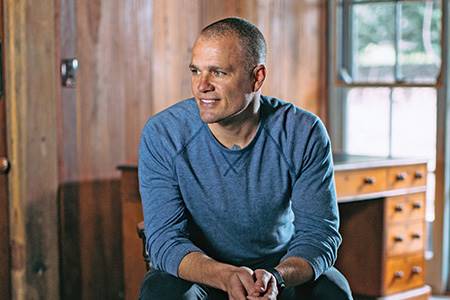James Bartle: The denim industry can lead life-transforming, generational change

James Bartle, CEO of Australia’s Outland Denim, believes manufacturers and brands should put competition aside to tackle the industry’s big problems – and supporting vulnerable workers in supply chains is among his top priorities.
According to the Walk Free Foundation, one in 130 women and girls globally are victims of modern slavery. Covid-19 threatens to only make this figure even more devastating with millions of already vulnerable people either out of work or living on reduced wages due to the pandemic. Human trafficking, just one form of modern slavery, is a $150 billion industry, which casts a large shadow over the value of the denim jean industry, worth an estimated $70 billion. When faced with these numbers, it’s impossible to ignore.
When we started building the foundation of what would become Outland Denim, I’ll humbly admit to not knowing a lot about denim, but I did, and still do, wholeheartedly believe that it is the key to solving this global injustice — the idea being to support women who have come from backgrounds of modern slavery, exploitation or vulnerability, not with charity but stable and safe employment that in turn allows them to support their family and contribute to the prosperity of their wider community. It’s nothing above and beyond. Incredible things will happen when we simply do the bare minimum in providing people the human rights and support they deserve. And in 2021, consumers understand more than ever that brands are either part of the solution or part of the problem.
Our brand launched with a product range of only black skinny jeans, at a pop-up in Queensland, Australia, in what was the hottest summer of the past 100 years. People still came in to try on and purchase. We launched an equity crowdfunding campaign just days before the World Health Organisation declared covid-19 a pandemic. People still invested, and helped us raise over AUD $1.32 million. Time and time again, we are reminded that consumers will show up for businesses that reflect their values, particularly when it comes to sustainability, even during the most uncertain chapter of our lifetime or a 40-degree day.
As we enter 2021, I believe our greatest challenge to overcome as an industry will be the rise of greenwashing. This manipulative marketing that stamps products as ‘100% sustainable’ or hides facts in the fine print, if at all, is the greatest threat to the pursuit of sustainable practices and innovation. It slows true progress; and while it may win positive sentiment in the short term, brands will suffer the repercussions of disenfranchised customers when the truth in their slogans is inevitably brought to light.
Combating greenwashing needs a multifaceted approach. We need to not put the onus on consumers to solve problems that were created by the industry. We need to empower our impact and corporate social responsibility teams with the tools they need to make true change. We need to invest and support research and advocate for that research to influence legislation that will regulate and bring accountability to our reporting and advertising. But most importantly, to mitigate greenwashing, brands need to establish an internal culture, driven from leadership, that morally rejects it.
Beyond this, we as denim manufacturers and brands have to put competition aside and collaborate on solutions to the challenges we face. We don’t exist in a vacuum so no one is going to win this ‘sustainability race’. In partnership with Bossa Denim, PSG and Nudie Jeans, Outland Denim in 2020 launched the Supply Network Intelligence System, which aims to protect and support those who work in the earliest and most overlooked segments of our supply chains. As more brands join to become members of the system, not only does impact increase but cost is reduced for all participants.
I’m hopeful as we enter a new year that we as an industry will continue to provide opportunities for wearers to connect with makers, as often the story of social injustice is told in statistics. In talking to one of our first staff members about three years into her working with us we asked, 'How is this helping you, this kind of employment and opportunity?' She said that because of this opportunity she’d been able to build a home for her family who previously lived under a plastic sheet. She went on to say that she was also able to buy her sister back off a man who owned her. This is the kind of life-transforming, generational change that the fashion industry can create, and I believe denim, with its universality, adaptability, loyalty and underlying rebellion is the community to lead the way.
James Bartle is the founding CEO of Outland Denim, a company described as being “on the vanguard of the socially conscious manufacturing movement”. Outland employs seamstresses who have been impacted by human rights abuses and gives them a future through sustainable employment and career progression in its Cambodia-based production facilities.













